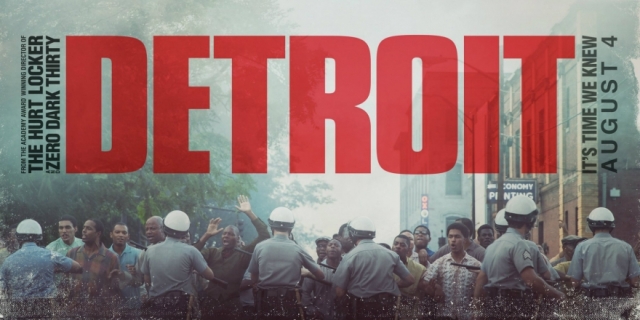
Hey, how would one go about writing a blog post in such a way as to appear woke without seeming like they’re trying to appear woke and without betraying there casual ignorance of American History? I’m asking for a friend.
I would never say Detroit is a bad film and I would never say that it is an enjoyable one. It’s immersive and effective and stacked with excellent performances, but man, Detroit is an absolutely miserable movie.
Director Katheryn Bigelow’s latest film depicts events that took place in the Algiers Motel on a night in 1967 during the 12th Street Riot. A majority of the film focuses on the unsettling, claustrophobic proceedings, eventually proving to be an empathic endurance test.
Detroit lacks the narrative thrust of Bigelow’s previous based-on-true-events film, Zero Dark Thirty. Where that film’s focus on the proceedings of a global manhunt lent it an inherent momentum, Detroit largely abandons any sort of momentum when it arrives at the events in question. The film’s most compelling threads, concerning musician Larry Reed (Algee Smith) and security guard Melvin Dismukes (John Boyega), are left to stew and stagnate and are only picked up again near the end of the film, making them feel like prologues and epilogues bookending the seemingly endless canvas of abuse and injustice that is the film’s lengthy second act.
It’s a bold move, the pacing equivalent of walking along the sidewalk for a few minutes, falling into a horrible, sprawling rancid puddle in which you become entrapped for like three hours, then finally getting out and walking home smelly, wet and miserable. The various narratives of the film are stopped cold and when they’re picked up again they are forever altered, certainly not unlike the lives of the victims of the incident in question.
Again, not a bad film, just an utterly miserable one.
Two decisions in particular really enable that misery, helplessness and injustice to permeate the film to its core.
The first, Barry Ackroyd’s handheld, documentarian cinematography, leaves the viewer feeling embedded in the unfolding events. Detroit is not a film looking for one perfect shot. It’s framing never feels planned and the images on the screen never feel composed so much as they feel captured.
The second, a sort of staggered, choosy contextualization, leaves the viewer with nothing to grasp but the abject abuse on screen. A brief animated sequence opens the film, providing a primer on the status quo of race relations in Detroit leading up to the 12th Street Riot and we’re shown a depiction of the onset of hostilities between police and the citizenry of the city, but I went into Detroit knowing nothing about the 12th Street Riot and I went out of Detroit knowing next to nothing about the 12th Street Riot. The backdrop to the events depicted in the film are taken as a given, treated like 9/11 is treated in Zero Dark Thirty, as an event that ubiquitous with the public consciousness and thus requires no explanation. The macrocosm of the film is given no heft and the microcosm it concerns itself with suffers for it. Additionally, there’s a nuance afforded to the police force in the film that is not extended to the citizens of Detroit, which only furthers the uncertainty in regards to the world and the circumstances outside of the hellish motel the audience is held up in.
Without any sort of broader canvas to help contextualize the events at the Algiers Motel and with it’s utterly immersive camerawork, Detroit often feels like being forced into a front row seat watching the abuse of the powerless at the hands of the powerful simply for the sake of it.
And that may be exactly what it is.
I left Detroit wondering what it wanted from me, what it’s intent was. It didn’t feel educational as it doesn’t take particular interest in any single individual or in the 12th Street Riot. Its attempts at keeping a journalistic distance from the events keep it from feeling like an earnest call to action against the injustice it depicts. Ultimately, Detroit just feels like a very, very effective reproduction of a horrible incident. It feels like a film that wants nothing more than to have its audience bare witness to an unforgivable abuse of authority.
I would never say Detroit is a bad film and I would never say that it is an enjoyable one, but if its purpose is indeed to have its audience bare witness to cold, hard injustice and institutionalized racism, it achieves those aims with remarkable success.